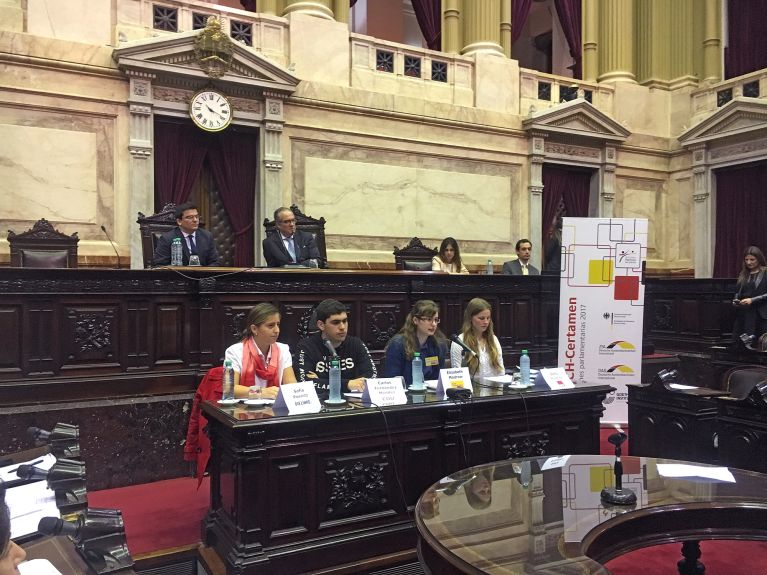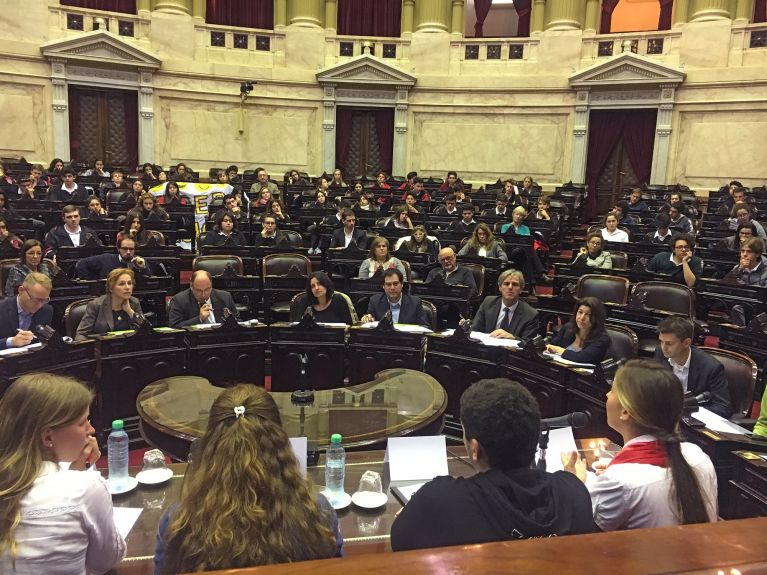Say it democratically
Migration and education opportunities: How pupils in the USA and Latin America immerse themselves in German politics in a public speaking competition.

Only when she gave an impromptu thank-you speech was she nervous: Sofia Poenitz’ voice went up a notch when she spoke of the “linda experiencia”, the “wonderful experience” the PASCH public speaking competition about the 2017 German general election had been for her. The 16-year-old pupil from the Goethe School in the Argentine city Rosario had held her own against three finalists in the plenary chamber of the parliament in Buenos Aires. Twenty-nine German schools abroad as well as schools that are part of the initiative “Schools: Partners for the Future” (PASCH), at which there is a special focus on German, took part in the competition – in Argentina, Uruguay, and the USA. The German Federal Foreign Office initiated the event.

The aim of the project is to get people learning German interested in political issues in Germany in an unusual way. It is not so much about having an excellent knowledge of German as motivating schoolchildren to address complex political issues in Germany. Beforehand they were given text material in their national language, for example translated excerpts from the political parties’ election manifestos, and they also conducted their own research on the Internet.
Eye contact and fairness
The competition was held at 20 schools in Argentina and Uruguay, and nine schools in the USA. Parallel to this, 40 schoolchildren from more than ten PASCH schools debated in a smaller competition at the Goethe-Institut in Cairo. In Latin America and the USA, the pupils prepared themselves in work groups for the topics migration, environmental protection, and Germany in the European Union. In order to reach the regional heat, they had to qualify at their school with a speech. In the second round the pupils proved how well they can fathom current German politics. A lottery determined which party position they had to represent.
The candidates had half an hour to prepare before they opened the discussions with a 90-second statement: The young participants presented and defended their positions seriously and with powerful eloquence, but without verbally hurtful attacks. The basic rules of rhetoric were also very useful here: Try to make eye contact with the audience, repeat important arguments, add emphasis with clear body language, not too many facts at once. Sofia Poenitz convincingly implemented precisely these points.
They were all very good, but Sofia Poenitz commented best on her opponents’ arguments.
At the final in the plenary chamber of the parliament in Buenos Aires the young Argentine assumed the role of a representative of The Left Party. She and her youthful fellow debaters, who were representing the Social Democrats (SPD), Christian Democrats (CDU), and Liberals (FDP), were by no means intimidated by the dignified, wood-panelled setting, the 200 listeners and distinguished guests such as the Chairwoman of the Committee on Foreign Affairs, Cornelia Schmidt-Liermann. Nor by the fact that those interested in the event could also follow it outside the parliament via livestream. The four finalists engaged in knowledgeable discussion about migration and refugees, as well as solidarity and education opportunities in Germany. “They were all very good, but Sofia Poenitz commented best on her opponents’ arguments,” Christian Krüger from the German Embassy Culture Department in Buenos Aires. That was one of the reasons why the nine jury members from “Netzwerk Deutsch” and German political foundations chose Sofia Poenitz as the winner. Her prize is an educational trip to Berlin with a companion of her choice.
High level of debate
In the USA the competition was also won by a talented young female. In the final, which was held at the Goethe-Institut in Washington, Grace Frey from San Antonio, Texas, won the jury over with a strong presentation on the topic of climate change. Beforehand she had already asserted herself with positions of the centre-right party she had been allocated, which actually are not at all in line with her own views. The 17-year-old high-school student was surprised to discover how effective populist phrases such as “Our people first” and “Migrants have to go” are in a debate, and how difficult it is for other parties to respond appropriately. Frey, who is due to complete high school in summer 2018, beat Ross Adkins and Lucas Wang, both students at Millard North High School in Omaha, Nebraska. She can now look forward to a teens’ course at one of the Goethe-Instituts in Germany. In language teaching and on organized excursions there she will gain first-hand experience of the diversity of opinion in Germany, said Dr. Stephanie Hafner, PASCH teaching expert at the Goethe-Institut in the US capital, which staged the competition in the USA.
Exciting, lively debates, conducted at an astonishingly high level, on major German political issues such as climate change and migration issues, will be the lasting memory of the first public speaking competition at US PASCH schools. “A democracy basically lives off a functioning culture of debate and discussion, off positions and arguments in the competition to curry voters’ favour,” said Boris Ruge, Deputy Chief of Mission at the German Embassy in Washington, at the finalists’ award ceremony. We can rightly hope that this meticulously organized competition has a positive impact on participants and audiences in all countries, and that they may get others interested in German as well. Learning a foreign language is not just about vocabulary and conjugations, but also exploring more deeply how a country ticks.





